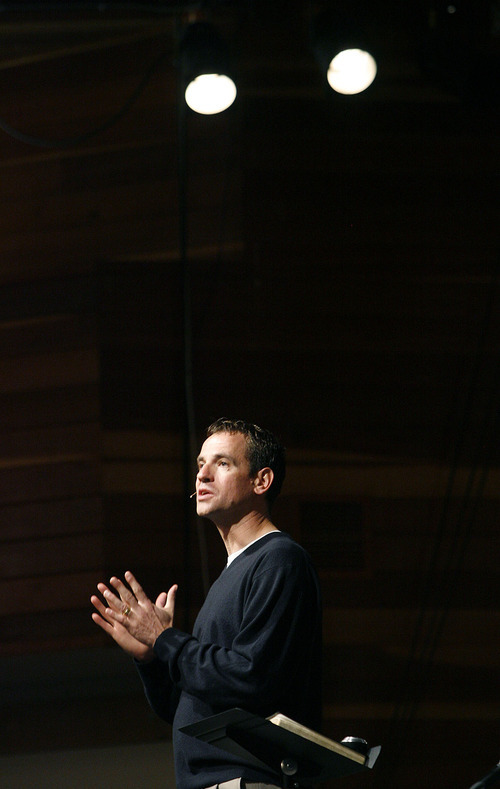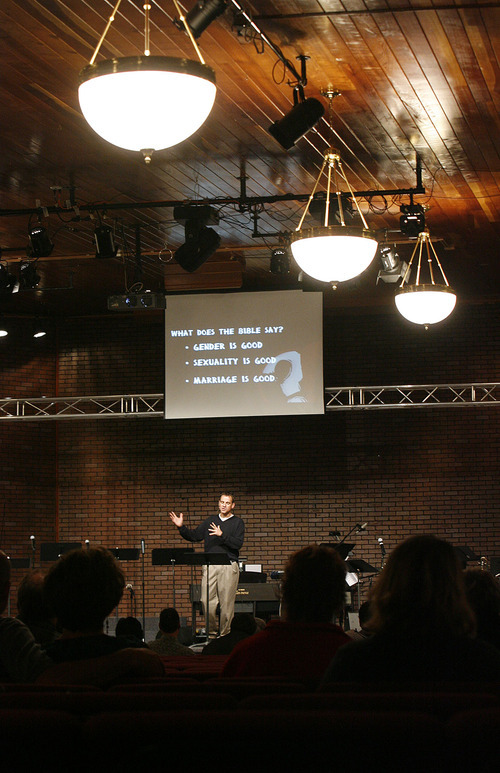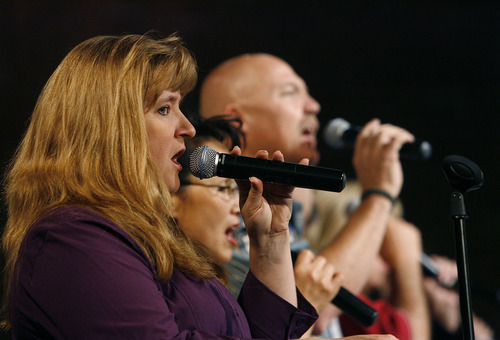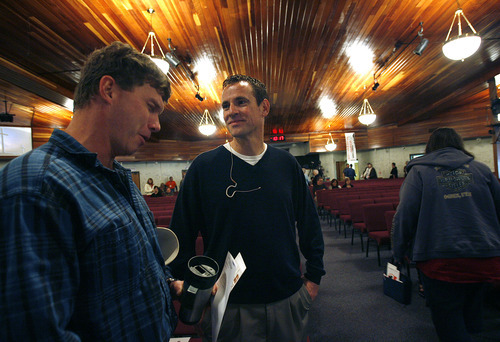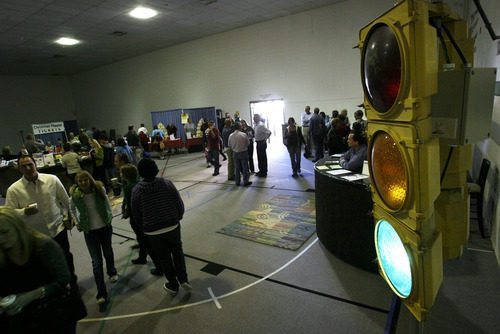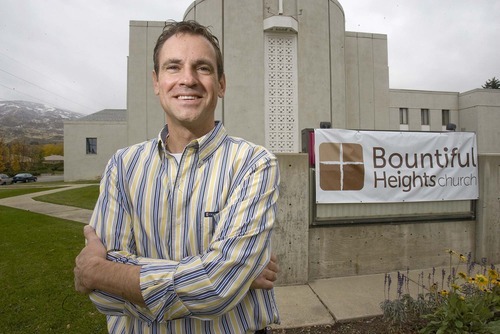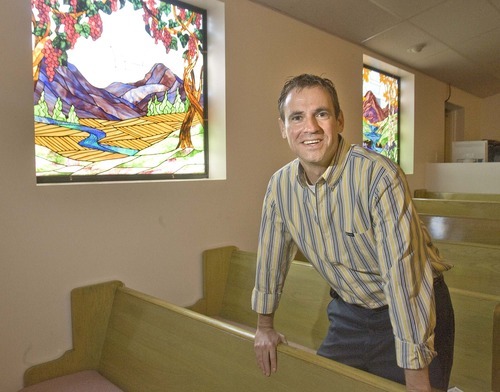This is an archived article that was published on sltrib.com in 2010, and information in the article may be outdated. It is provided only for personal research purposes and may not be reprinted.
Bountiful • It took a lot of moxie, sweat and prayer for a core group of families to keep Grace Baptist Church, one of south Davis County's few Protestant congregations, viable through the years.
So when the chance to merge with what may be Utah's largest Protestant church, Washington Heights in Ogden, came up last spring, the faithful at the small Bountiful congregation were both relieved and wary.
Some worried about Grace's loss of its hard-won identity, says Becky Randle, a longtime member. She remembers her own reaction: "Oh my, that's scary."
Yet by the time each congregation voted in September, the fears had been put to bed.
"We have the same DNA," Randle says. "We just felt like God gave us an opportunity to blend these two church families together and that together we could do a lot more for the community."
The two churches, sister congregations in the Conservative Baptist Association, voted overwhelmingly to join forces. The union took effect in October, but church leaders have been refurbishing the Bountiful building and getting other kinks out before formally launching the new multicampus Heights Community on Dec. 19.
Washington Heights Church will keep its name (it deleted the word Baptist earlier in the year). Grace now is Bountiful Heights, and the Spanish-speaking services, which soon may be a full-fledged church in downtown Ogden, are called Nuevas Alturas, or New Heights in English.
Handling administrative tasks in Ogden means the pastors are freed for ministry when they are in Bountiful, says senior pastor Roy Gruber, who keeps an office at both campuses.
"It really allows us to focus on ministry and the people," Gruber says.
Pews blues • When Grace Baptist bought the iconic white LDS meetinghouse at the Bountiful intersection of 400 North and 400 East in the early 1990s, the congregation expected big growth.
"We thought our numbers would increase significantly," Randle says. "They never really did."
The church would attract Utah newcomers, but they would leave after a few years, she says. "When you lose three or four families, it makes a big difference."
The church's auditorium rarely filled to capacity with 150 worshippers, Gruber says, but after longtime pastor Pat Edwards retired, attendance fell as low as 30 or 40 on a Sunday.
Those numbers rebounded to 70 after a long-awaited new pastor arrived, Gruber says, but the cleric could see it would be a struggle to keep growing and, before returning to Colorado, suggested the merger with Washington Heights.
Since the alliance, attendance is up to 140 or 150, mostly from word-of-mouth advertising about the changes under way, Gruber says. A children's ministry is rolling, and 10 to 15 youths regularly gather on Sunday nights now.
"That's a large part of what we're about," he says. "We do want to share our good news with our community, but mostly that happens life to life and people inviting their friends and neighbors."
Big tent • Washington Heights always has been the big sister 20 miles to the north.
In fact, it is likely Utah's largest Protestant church, with more than 2,100 attending on an average Sunday.
"I don't know any other church in the Protestant world [of the Wasatch Front] that has more people coming on a Sunday," says Jeff Silliman, pastor at Cottonwood Presbyterian Church and former president of the now-defunct Salt Lake Theological Seminary.
Silliman credits much of Washington Height's robustness to good pastors.
Other than the early years in the 1950s, which saw more turnover, the church has had just three lead or senior pastors. Six years ago, Gruber replaced Les Magee, who was there for nearly two decades. Besides Gruber, the church employs 10 other pastors and directors in charge of various ministries.
A retired pastor, Hank Green, says Washington Heights always has attracted people from other denominations.
"Our church," Green says, "truly has had much more of an interdenominational feel than a typical Baptist church."
Green came to Utah in 1968 to teach the church's Bible Academy, a release-time education program for students at nearby Bonneville High. The program ended in 1989 when Washington Heights moved to its current Ogden home at 1770 E. 6200 South.
The church's visibility from U.S. Highway 89 helped its growth — as did its proximity to Hill Air Force Base. A sizable chunk of its worshippers always have come from the base.
Gruber, a New Jersey native with a bachelor's degree in biblical literature and a master's degree in counseling and theology, brought new ideas, such as an informal Sunday evening service modeled on the cozy feel of a coffeehouse.
Today, Washington Heights has three services each Sunday: one with more traditional hymns, one with a praise band, and the cafe with contemporary music.
"That continuity of really fine pastors has meant so much for the stability and the confidence in the life of the church," says Green, who retired three years ago after serving in a variety of roles.
Gruber says he's not bothered that formal membership in the church remains a fraction of the Sunday attendance. About 500 are on the rolls. Many simply don't want to join, he says, even though they contribute money and remain involved.
"I'd rather have more people attending," Gruber says, "than numbers [of members]."
God before politics • Although the Heights Community remains part of the Conservative Baptist Association, it is not advertised widely because of misconceptions that the word "conservative" refers to its politics.
"For us, it's not about the name," Gruber says, "but who God is and what he has for us."
When the denomination began in the 1940s, Gruber says, the word referred to those Baptists' insistence on preserving the Bible as God's word.
Likewise, Washington Heights dropped "Baptist" from its name because it conjures up the wrong impression due to the behavior of some Baptists, such as the anti-gay preacher from Westboro Baptist Church in Kansas who protests at military funerals.
Perhaps the biggest brush with Baptists many Utahns have had was when the Southern Baptists went door to door challenging Mormons during their 1999 convention in Salt Lake City.
"That's not something we would ever do," Gruber says.
The church does not take political stances, but at times tackles issues with moral and political dimensions. For instance, a series of sermons this fall was titled "Hard Questions," and one of them asked whether the Bible condemns homosexuality.
"The Bible is pretty clear on the issue. Does it support it? No," says Gruber, who nonetheless says it's a "huge mistake" for Christians to "jump up and down and sometimes get downright mean about it."
In his sermon, he recounted a story from the Gospel of John in which Jesus invites those without sin to throw a stone at the prostitute. All of her accusers walk away.
"He doesn't condone what had been a part of her life, but he doesn't condemn and write her off either. Instead, he calls her to a whole new life," Gruber says. "That's what God is calling everybody to, whether the issue is homosexuality or something else."
His goal, Gruber says, is to speak to whatever the Bible addresses.
"We don't need to avoid it or defend it, either," he says. "The Bible can take care of itself, but we are called to speak the truth in love."
Now that his church has merged with the Bountiful congregation, Gruber says, there will be wider opportunities to do just that. "There is a real opportunity for like-minded churches to work together and do good for the community."
The Heights Community is training leaders of smaller groups — called God & Others (GO) — to help adults in the Bountiful congregation form close bonds, an answer to the trend toward smaller "house churches." And it is planning a week of service next summer in West Bountiful, patterned after a recent project in which dozens of Washington Heights worshippers spent a week refurbishing 24 houses and lawns in central Ogden.
Bountiful Heights has neither the parking nor the building to grow as large as Washington Heights.
"We're great with that," Gruber says. "It isn't about how many folks we can get in one location. It's about reaching out as much as we can."
Christmas shows and services
The Heights Community is presenting its Christmas theater — a long tradition at Washington Heights — on several more nights this month. This year's musical drama is "A Christmas Tale," a Willow Creek Production written by Aaron Reynolds. Worshippers from Washington Heights make up the cast.
Theater-style performances • Bountiful Heights, 390 N. 400 East, Bountiful, Sunday, Dec. 5, at 7 p.m.; Washington Heights, 1770 E. 6200 South, Ogden, Thursday and Friday, Dec. 9-10, at 7 p.m. Free without a meal; $6 or $12 with small or regular meals.
Banquet-style performances • Washington Heights, Saturdays, Dec. 4 and 11, at 6 p.m. $119 for a table of eight.
Services • The Heights officially will launch the merger of its two campuses Dec. 19, with services at the usual times: 10:30 a.m. in Bountiful, and 9, 10:20 and 11:45 a.m. and 7 p.m. in Ogden. Christmas Eve's candlelight services will be Dec. 24 at 4:15, 5:30 and 6:45 p.m. in Ogden and 7 p.m. in Bountiful.
More information • http://www.theheightscommunity.org


